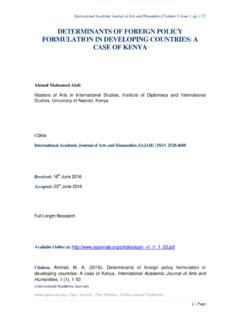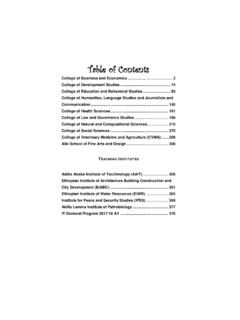Transcription of FACTORS AFFECTING SUPPLY CHAIN MANAGEMENT …
1 International Academic Journal of Procurement and SUPPLY CHAIN MANAGEMENT | Volume 2, Issue 1, pp. 37-49 International Academic Journals | Open Access | Peer Review | Online Journal Publishers 41 | Page FACTORS AFFECTING SUPPLY CHAIN MANAGEMENT PERFORMANCE IN INTERNATIONAL NON-GOVERNMENTAL ORGANISATIONS IN KENYA Anthony Njiiru Ngoto Master of Science in Procurement and Logistics, Jomo Kenyatta University of Agriculture and Technology, Kenya Dr. Assumpta Kagiri Lecturer, Jomo Kenyatta University of Agriculture and Technology, Kenya 2016 International Academic Journals Received: 27th May 2016 Accepted: 31st May 2016 Full Length Research Available Online at: Citation: Ngoto, A. N. & Kagiri, A. (2016). FACTORS AFFECTING SUPPLY CHAIN MANAGEMENT performance in international non-governmental organisations in Kenya.
2 International Academic Journal of Procurement and SUPPLY CHAIN MANAGEMENT 2 (1), 37-49 International Academic Journal of Procurement and SUPPLY CHAIN MANAGEMENT | Volume 2, Issue 1, pp. 37-49 International Academic Journals | Open Access | Peer Review | Online Journal Publishers 37 | Page ABSTRACT Efficient SUPPLY CHAIN MANAGEMENT has an effect on the overall internal performance of any organisation. Current economic crisis and competitiveness of global organisation increases its importance even further. Organizations adopt numerous business improvement methodologies to improve the business performance. Manufacturers and researchers have noted a number of problems regarding SUPPLY CHAIN activities in their research and practice.
3 This research project was centred on a survey of the challenges facing effective implementation of SUPPLY CHAIN MANAGEMENT in Non-Governmental organisations and it has focused on International Humanitarian Non-governmental organisations in Kenya. SUPPLY CHAIN MANAGEMENT efficiency and effectiveness has profound implications on any organization s ability to meet its customer s demands, its reputation, and its overall financial success. There is need for humanitarian organisation to adopt best SUPPLY CHAIN MANAGEMENT practises that will meet the overall strategy which is to achieve value for money and to develop world class procurement systems and practices and ensure quality and timely supplies to study is taken against the backdrop of the importance of non- governmental organisations in adopting efficient SUPPLY CHAIN MANAGEMENT systems bearing in mind the volume of goods and services purchased is continuously aim of this study is to access the FACTORS AFFECTING SUPPLY CHAIN MANAGEMENT performance within international non-governmental organisations in Kenya.
4 The objectives of the study were; establishing the effect of strategic supplier partnerships, contract MANAGEMENT and information communication technology on SUPPLY CHAIN MANAGEMENT performance. The study is descriptive by design. This study was conducted on a population of SUPPLY CHAIN managers in 302 registered INGOs that have been active over the past 5 years to August 2014. Out of these, the researcher randomly sampled 172 SUPPLY CHAIN MANAGEMENT staff of INGO to which the questionnaires were administered. Data was collected through the questionnaire which was organized to answer set objectives in the study. Data was analysed using descriptive statistics frequency distributions and measures of central tendencies.
5 The results of the survey were presented using tables, charts and graphs. The SPSS computer software was used to aid the analysis. Multiple regression analysis was also used to determine the relationships between the variables and the effective implementation of SCM. Key findings: the study revealed that SUPPLY relationship positively affects SUPPLY CHAIN MANAGEMENT performance though many Non-governmental organisations are challenged by the complexity of networks in managing study established that contract MANAGEMENT affects SUPPLY CHAIN MANAGEMENT performance, few Non-governmental organizations use updated documented policy to monitor contracts. The researcher also noted that information sharing is a vital tool in SUPPLY CHAIN MANAGEMENT performance however some Non-governmental organizations are still using paper work as a mode of International Academic Journal of Procurement and SUPPLY CHAIN MANAGEMENT | Volume 2, Issue 1, pp.
6 37-49 International Academic Journals | Open Access | Peer Review | Online Journal Publishers 38 | Page communication while telephone is the most common mode of communication. Key Words: SUPPLY CHAIN MANAGEMENT Performance, Strategic Supplier Partnerships, Contract MANAGEMENT , Information Sharing INTRODUCTION SUPPLY CHAIN MANAGEMENT (SCM) represents a significant change in the way that organizations view themselves and has witnessed values created through the integration and coordination of SUPPLY , demand and relationships in order to satisfy customers in an effective and profitable manner both in the private and public sectors. SUPPLY CHAIN MANAGEMENT is applied by companies across the globe due to its demonstrated results such as delivery time reduction, improved financial performance, greater customer satisfaction, building trust among suppliers, and others.
7 According to Ronnqvist and Weintraub (2008), companies resort to SUPPLY CHAIN practices to improve their performance. Recently, Aid Agencies have become increasingly interested in how SUPPLY CHAIN and their stakeholders impact on the organizational strategy (Walker and Wendy, 2006). Successful implementation of SCM is seen as closely dependent upon the need for breaking down barriers not only between internal departments and business processes, but also across companies within the whole SUPPLY CHAIN (Vollman et al., 2005). Its success is also associated with the challenging development of a new culture based on empowerment on-going shared learning and continuous improvement. Projects implemented by NGO s involve the use of donor funds to achieve specific objectives for the benefit of the public.
8 In Kenya, NGOs are licensed and regulated by the NGO Coordination Board. These organisations supplement government efforts to improve the living standards through implementation of diverse donor funded projects. However, majority of such donor funded projects often run into hurdles in the course of implementation. Most of these hurdles relate to SUPPLY CHAIN MANAGEMENT policies and the need to adhere to donor guidelines which do not necessarily result in effective utilization of funds and efficiency in service delivery (Kirugu, 2011). There is need for humanitarian organisation to adopt best SUPPLY CHAIN MANAGEMENT practices that will meet the overall strategy which is to achieve value for money and to develop world class procurement systems and practices and ensure quality and timely supplies to beneficiaries Kovacs (2004).
9 The study is taken against the backdrop of the importance of Non-governmental organisations in adopting efficient SUPPLY CHAIN MANAGEMENT systems bearing in mind the volume of goods and services purchased is continuously rising. For instance, the United Nations (UN) procured in the year 2000 around 40 % more than in 1996. The purchase of relief items (not services) at the UN amounts around 60 % of total procurement expenditures (Taupiac, 2001). International Academic Journal of Procurement and SUPPLY CHAIN MANAGEMENT | Volume 2, Issue 1, pp. 37-49 International Academic Journals | Open Access | Peer Review | Online Journal Publishers 38 | Page Non-governmental organizations (NGOs), like many other companies, are oftentimes faced with the challenge of managing their SUPPLY chains with dwindling financial resources, a lack of expertise, and insufficient personnel.
10 Most of these companies are surprised to learn that use of best practices in procurement processes can actually help them operate more efficiently while reducing their operating costs by as much as 60%.An efficient but flexible humanitarian relief SUPPLY chains is the key subject in disaster relief, discussed from academics as well as practitioners (Kov c & Spens, 2007). STATEMENT OF THE PROBLEM SUPPLY CHAIN MANAGEMENT efficiency and effectiveness has profound implications on any organization s ability to meet its customer s demands, its reputation, and its overall financial success (Ambe, 2009). SUPPLY CHAIN MANAGEMENT inefficiency presents the single biggest opportunity for operational inefficiencies in any organization Feldman (2003).






